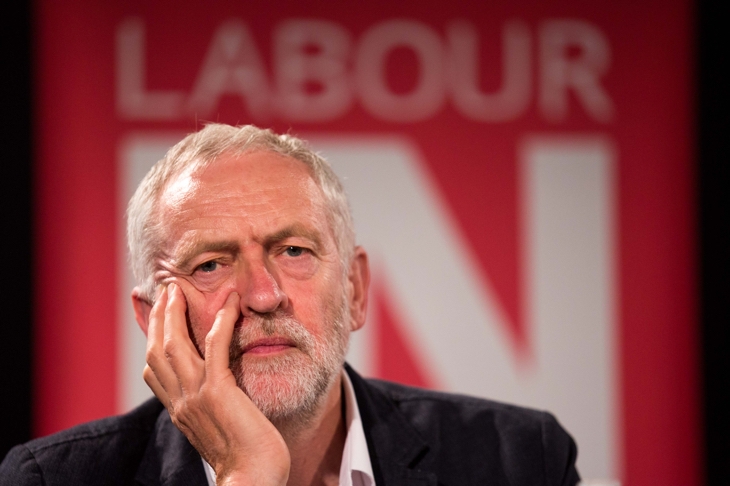Today’s polls suggest that Theresa May could be on track to secure a Commons majority of 150, reversing – in just 20 years – the landslide that was inflicted on the Tories in 1997. These figures, from the Daily Telegraph, reveal no fresh agony for Labour: already the worst case scenario being floated in Labour circles would involve a catastrophic loss of about 100 MPs. This is an apocalyptic vision, mainly propagated by centre-leaning folk who have seen their influence wane over the past two years, and is something of a long-shot (the bookies currently favour a Labour seat band of 150-199, but only price 100-149 at 5/2). But let’s say it does happen: what happens next?
Whether or not Corbyn stands down in this future, the Labour party would continue to be controlled by the ‘hard left’. Why? Because a parliamentary Labour party of just 125 MPs is good news for them. Under current rules, MPs need the support of 15pc of the PLP before they can stand in a leadership contest – which amounted to the support of 35 MPs in 2015 and 2016. But in a post-landslide environment, that number would drop to around 19 MPs (with MEPs set to be included in the franchise at the next leadership contest). With moderate MPs, or those perceived as ‘Blairite’, likely to be substantial casualties, and a roughly Corbyn-leaning NEC hoping to install more supportive candidates ahead of 8 June, that figure could be low enough to allow a ‘hard left’ candidate onto the ballot paper, even if Corbynistas like Cat Smith and Clive Lewis exit Westminster in June. That’s without the McDonnell Amendment even passing, which would lower the threshold to 5pc.
Losing 100 MPs would cost the party a considerable amount of its short money, the financial assistance given to a parliamentary opposition, which, along with an exodus of full-payment party members (unlike the £3 registered supporters) and withdrawal of support from the largest trade union, Unison, would prove debilitating. The Labour party would no longer be a campaigning force: 50 or so MPs would break off, merge with the Lib Dems into something like the ‘Social Democrats’, which would look and smell like the SDP.
Much has been made of the need for proper opposition to the Government and this is true, in a nebulous sense. But a conscientious government should be able to perform, even without the scrutiny of other parties. A clearer and more compelling argument is made by James Forsyth on last week’s Spectator podcast, where he says ‘a revived Labour party is crucial to the Union winning’ a second Scottish independence referendum. ‘You need to be able to say to voters in Scotland…look, this is not going to be rule by the Tories forever,’ he says, ‘having a credible Labour party suggests you’re not going to be stuck in a one-party state in Britain.’
For all the success of Ruth Davidson’s Scottish Conservatives, the biggest beneficiary of Labour’s collapse north of the border has been the SNP. The Conservatives have supplanted Labour as the opposition in Holyrood, because they present a cogent alternative to the nationalists. But even if the Tories manage to take seats in Scotland, Theresa May will have a harder time arguing against IndyRef2 after this snap election, after she herself called an election because she found it politically useful. As Alex Massie wrote on the day of the U-turn, ‘Mrs May cannot win a mandate for herself while then denying a mandate to the party that wins the Scottish portion of this election.’
The Labour party will be looking at a decade out of government, or perhaps longer. Nicola Sturgeon could then tell Scots that the choice they face is either independence or unchallenged Tory rule, a more convincing argument than she had in 2014. When IndyRef2 comes – as it must surely once the SNP deliver a majority of Scottish seats with that pledge at the heart of their manifesto – a Theresa May solo tour of Scotland will convince few people of the viability of the Union. She needs a support act who could realistically be in government in 2022.
The question on 8 June, therefore, shouldn’t be ‘do you want Jeremy Corbyn as Prime Minister?’. Instead the question should be ‘is whipping Labour good for Britain?’. A slender Tory majority would keep Theresa May in check through the Brexit negotiations (to the benefit of Leavers and Remainers alike), present viable competition in Westminster to the Scots during IndyRef2, and allow the Parliamentary Labour Party to replace Corbyn with a mainstream leader like Yvette Cooper, Keir Starmer or Chuka Umunna. And as this election campaign has proven already, Labour still has plenty of good ideas: a £10 minimum wage, secured rights for EU citizens, endless bank holidays.
Jeremy Corbyn has undoubtedly caused some Labour voters to abandon the party, but they must remember that the fabric of the United Kingdom is held together by an electable opposition. If Labour is decimated, the effect on British democracy may prove every bit as grave as the feared consequences of a Corbyn premiership.
Nick Hilton is the Spectator’s broadcast producer and previously worked with Labour’s 2015 General Election campaign







Comments